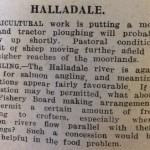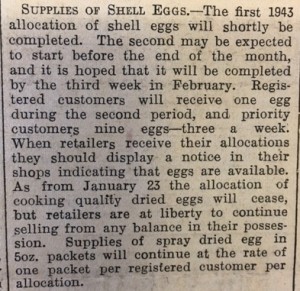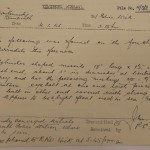On 26 January the German defences in Stalingrad were split in two; the southern pocket was overrun soon after and General Paulus and his staff were captured, though the northern pocket still fought on. Also this week, in a sign of things to come, the first all-American bombing raid took place at Wilmhelmshaven on 27 January, and on 30 January the RAF bombed Berlin in daylight for the first time. Also on 30 January the Japanese evacuated the Pacific island of Guadalcanal.

In Strath Halladale the farmers were gearing up for tractor ploughing, the Halladale river was again open for salmon fishing and “Pastoral conditions permit of sheep moving further afield on the higher reaches of the moorlands.”

The Council’s Education Committee this week rewarded the exceptional attendance records of two pupils: “The Committee resolved that a watch be awarded to each of Esther Paterson and Jessie J.R. Waugh, who had completed five years’ perfect attendance.” This was confirmed when the Head Teacher of Brickigoe School wrote in the log book on 29 January: “Intimation was received from the Clerk this week, that Jessie E.R. Waugh is to be awarded a wristlet watch for five years’ perfect attendance.”
This was confirmed when the Head Teacher of Brickigoe School wrote in the log book on 29 January: “Intimation was received from the Clerk this week, that Jessie E.R. Waugh is to be awarded a wristlet watch for five years’ perfect attendance.” 
 The John O’Groat Journal this week offered a reminder of the restrictions of wartime rationing, giving notice of the allocation of shell, or fresh eggs: “Registered customers will receive one egg… and priority customers nine eggs – three a week”. The allocation of cooking quality dried eggs had ceased, and “Supplies of spray dried egg in 5oz. packets will continue at the rate of one packet per registered customer.”
The John O’Groat Journal this week offered a reminder of the restrictions of wartime rationing, giving notice of the allocation of shell, or fresh eggs: “Registered customers will receive one egg… and priority customers nine eggs – three a week”. The allocation of cooking quality dried eggs had ceased, and “Supplies of spray dried egg in 5oz. packets will continue at the rate of one packet per registered customer.”
Finally this week, on 31 January Constable Kennedy of Dunbeath reported an object found on the foreshore at Berriedale: “Cylinder shaped missile 18” long by 1½” in diameter at each end, about 5” in diameter at centre, painted dull grey and has the following markings: ME – G.E.C. made in Gt. Britain. Eyeball in one end with piece of string attached, bulb in other end covered with strong ribbed glass. Appears to be a light float used in sea rescue work.” Constable Kennedy had taken the object to Dunbeath Police Station, “where it can be seen.”

